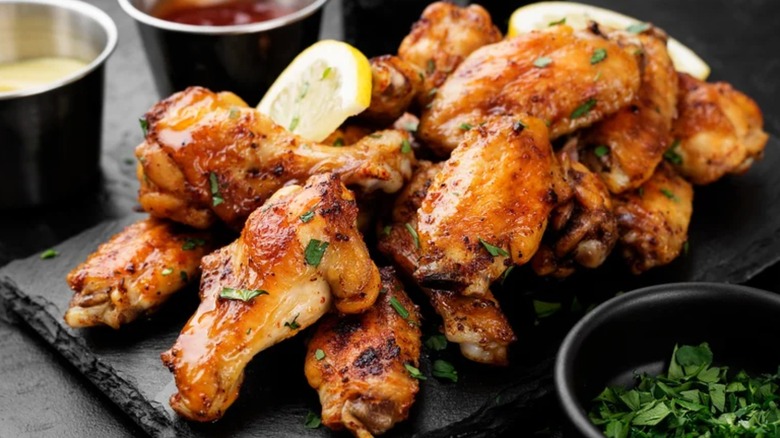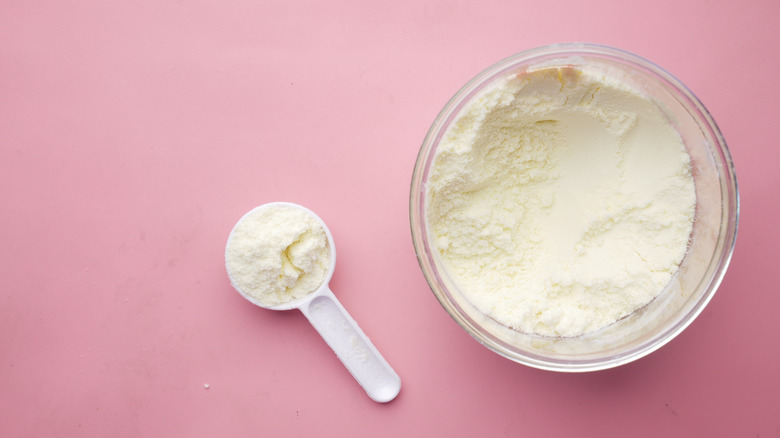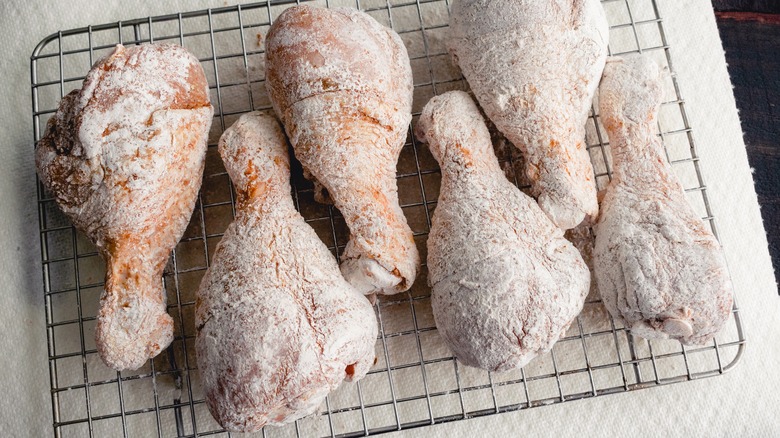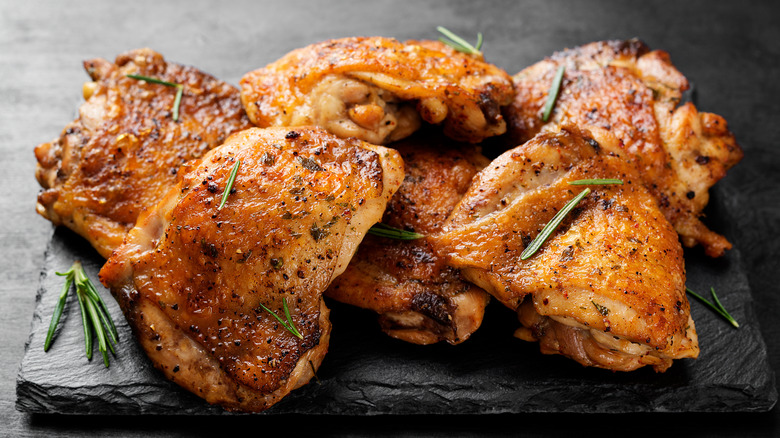The Ingredient To Help Your Chicken Brown To Perfection
If you've ever found yourself accidentally overcooking your chicken by waiting for that glorious browned hue to appear, you're not alone. That golden brown exterior is caused by the Maillard reaction, which Science Direct explains is basically a dance between a protein and a sugar that is triggered by heat. When it comes to meat, without the Maillard reaction, there is little to no flavor as heat creates a caramelization, which then changes the color and taste of the food — from wan and bland to complex and delicious.
What is the best way to achieve the Maillard reaction in a short amount of time? When marinating meat, sugar, or a product containing sugar, like BBQ sauce, is often present. Because sugar needs heat to create a Maillard reaction, marinades definitely help as the meat is serving as the protein. However, it could be a good idea to add an extra boost of both protein and sugar to your next marinade, dredging station, or dry rub for meat if you want to speed up the browning process.
For better browning, reach for milk powder
Stumped as to what type of dry ingredient could add both protein and sugar to the outside of the meat, boosting its Maillard reaction and creating a nicely browned exterior? The answer might be lurking in your cupboard at this very moment.
That ingredient is milk powder, also known as powdered milk or dry milk. Often sold in a canister and produced by companies including Carnation and Horizon Organic, dry milk is pretty much exactly what it sounds like: Liquid milk that is evaporated using an industrial process (via USA Emergency Supply). Available in both non-fat and full-fat varieties, powdered milk can be reconstituted with water when camping or on the road, or it can be incorporated into the dry ingredients of baked goods such as cookies, pies, and breads, adding "a bonus layer of richness, sweetness, and creaminess to pretty much any treat," according to Epicurious.
Milk powder and the Maillard reaction
But let's get back to milk powder's magical properties when it comes to browning meat, shall we? One proponent of the technique is America's Test Kitchen (ATK), with the outlet reporting that when one of their cooks worked through a series of tests to hurry up the browning process on pork chops, they found that dredging the meat in milk powder resulted in a much quicker browning. However, the pork chops ended up being a bit too sweet.
ATK prefers the milk powder technique on grilled chicken breasts, whose flavor takes well to a bit of sweetness. After coating breasts with half a teaspoon of milk powder and lightly spraying them with cooking spray to adhere, each breast took less than two minutes to brown efficiently with "nice grill marks," the outlet's test kitchen found.
Heston Blumenthal demonstrates this technique on YouTube, stating that not only does milk powder help the meat brown perfectly and quickly, it helps chicken taste more like chicken. He passes the milk powder through a sieve onto the chicken to prevent clumping, and pops it straight into the oven for a nice roast. When it's done, you'll notice brown marks and edges, and perfect bits at the bottom of the pan that makes for a great base for gravy.
The science behind milk powder and browning meat
So why does dry milk work so well to brown the outside of meat? It's a matter of science, America's Test Kitchen explains. According to the outlet, dry milk contains about 36% protein, but it also contains about 50% lactose, which is, of course, sugar. With both the amino acids from protein plus the lactose naturally present in milk, the two compounds needed to set off the Maillard reaction are right there.
But dry milk's aid in browning meat isn't limited to the Maillard reaction, ATK writes. The powder also has a drying effect on the exterior of the meat, absorbing excess moisture – like you would with a paper towel — in order to help the meat brown instead of steam once it's exposed to the heat of a pan or grill. And if you're thinking of glazing your meat with a sauce once it's cooked, as ATK does in its recipe for grilled glazed boneless, skinless chicken breasts, then milk powder offers one more benefit, creating a thin, tacky outer layer that holds onto glaze even better than moist, slippery cooked meat normally would. We feel compelled to ask: Is there anything milk powder can't do?



